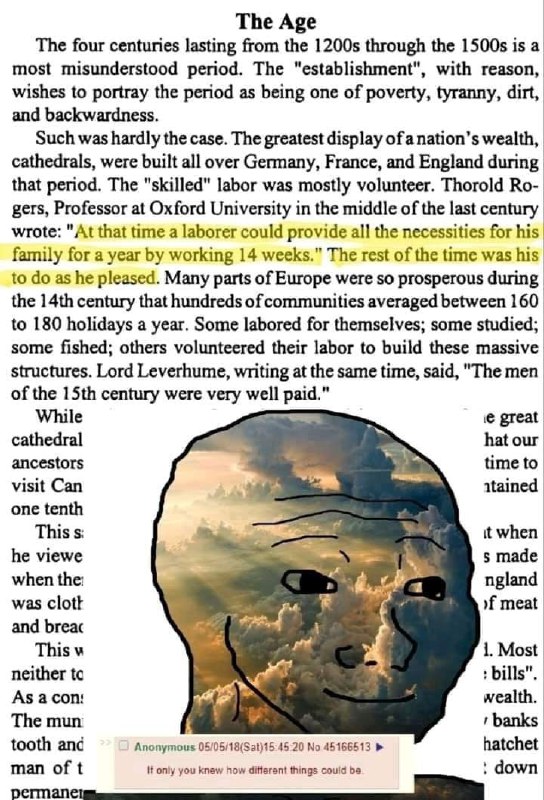Most Recent News


Popular News



The Dark Ages were not so "dark" after all.

The Dark Ages: Pretty Great.
The Enlightenment: Not very enlightening at all.
Always remember that modernity subverts everything, and the victor chooses how to define the past. This article will hopefully be a lesson on that subject.
Let’s start with a Meme Monday:

If only you knew how different things could be, if we had just stuck to tradition.
Thorold Rogers:
Werner Sombart (a fascinating man with both anti-Nazi and anti-communist underpinnings who also studied the Middle Ages) found that:
Notable other historians, such as William Hesketh Lever and Juliet Shor, came to similar conclusions.
Even modern day propaganda machines are backtracking and admitting similar conclusions, since the evidence is becoming overwhelming:
Column: Why a medieval peasant got more vacation time than you
Life for the medieval peasant was certainly no picnic. His life was shadowed by fear of famine, disease and bursts of warfare. His diet and personal hygiene left much to be desired. But despite his reputation as a miserable wretch, you might envy him one thing: his vacations.
Plowing and harvesting were backbreaking toil, but the peasant enjoyed anywhere from eight weeks to half the year off. The Church, mindful of how to keep a population from rebelling, enforced frequent mandatory holidays. Weddings, wakes and births might mean a week off quaffing ale to celebrate, and when wandering jugglers or sporting events came to town, the peasant expected time off for entertainment. There were labor-free Sundays, and when the plowing and harvesting seasons were over, the peasant got time to rest, too. In fact, economist Juliet Shor found that during periods of particularly high wages, such as 14th-century England, peasants might put in no more than 150 days a year.
As for the modern American worker? After a year on the job, she gets an average of eight vacation days annually.
[…]
Go back 200, 300 or 400 years and you find that most people did not work very long hours at all. In addition to relaxing during long holidays, the medieval peasant took his sweet time eating meals, and the day often included time for an afternoon snooze. “The tempo of life was slow, even leisurely; the pace of work relaxed,” notes Shor. “Our ancestors may not have been rich, but they had an abundance of leisure.”
It is only under the modern times that we view everything in the Middle Ages as “dark”.
It is also only under the modern times that we view wealth (Mammon) as better than leisure, knowledge, or skill.
This is not a coincidence. The ruling elites have a strong incentive to degrade and push aside the era of Christendom and the proliferation of Western Civilization.
Consider the following, which is directly related to our Meme Monday image above, which references Prof. Rogers:
Moreover, most people are afraid to question evaluations of pre-modern and especially medieval times like that of Thomas Hobbes who described life in those times as “nasty, brutish, and short.” Thus, modern discussion of the medieval economy is often limited to perceptions not facts, skewed judgments not certainties, prejudice not impartiality.
[…]
A Buried Perspective from Oxford
There is economic data to support the claims that workers prospered in medieval times. One place this can be found, regarding England, is in the works of the brilliant nineteenth-century scholar and economist James Edwin Thorold Rogers (1823-1890). Besides his academic career, Prof. Rogers also served as Member of Parliament for several years.
His greatest achievement, however, was his work as professor of political economy at Oxford. He wrote two books analyzing data collected over centuries. Using the economic criteria of his day, he presents an accurate analysis of the past. While his positions were not always popular, no one disputes his erudition and indefatigable research.
In his book, Six Centuries of Work and Wages, Prof. Rogers claims England’s economic history can be ascertained accurately and comprehensively by looking at the kingdom’s public records dating back to the thirteenth century. “No other country possesses such a wealth of public records,” he claimed. The facts he uncovered stand on their own without major interpretation…or misinterpretation.
How a Dark Age Became a Golden Age for the Worker
What Prof. Rogers found in the records was myth-shattering. Although not Catholic himself, his evaluation of England’s Catholic civilization does much to prove the Church’s important role in society. During the three centuries preceding Henry VIII’s rupture with Rome, Prof. Rogers believed the laboring classes were more comfortable and prosperous than any other later period. It was, he claims, a veritable “golden age for English labor.”
“I believe, indeed, that under ordinary circumstances the means of life were more abundant during the Middle Ages than they were under our modern experience,’ he writes. “There was, I am convinced, no extreme poverty.”
[…]
His works focus on the medieval laboring classes, which he claims were in steady upward ascendance. The wages of a medieval stonemason, for example, were better than those of his nineteenth-century London counterpart. Instead of working fifty-six-hour workweeks, the late medieval worker clearly “worked for only an eight-hour day.”
[…]
His portrayal of medieval economy contrast with the brutish, nasty, and short narrative that more accurately applied to Hobbes’ own Enlightenment times.
His research demonstrates that the data supports the scholarly claim that conditions of the medieval worker were wholesome and good.
Don’t take my word at face value. Go read it yourself. Six Centuries of Work and Wages is available online for free. It’s one of the most highly cited works in the field and for its time period. It demonstratably proves that the time period was anything but “dark”.
Our rulers hate Christendom, tradition, and the permissibility of us peasants to have leisure time:
It’s far more advantageous to them if we are too busy working to do anything healthy, beneficial, or creative.
And perhaps more importantly, it is advantageous to them to make us dependent on continual income for survival. If we only had to work a few months a year, that would give all of us a lot more opportunities in openly resisting them. But we must be afraid of being doxxed or otherwise thrown out of work, because we need a constant income stream in the modern world.
We slave away to give the rulers more money, so they can then use that money to further subvert and enslave us.
It should be telling that they lie and paint the Middle Ages as a time when everyone was shackled to work, when the reality is exactly the opposite. During the Middle Ages, even the peasants had plenty of time to communalize, enjoy their families, converse at length in the town square, chase hobbies and passions, and similar joyful activities.
For us moderners, we are lucky if we get more than a week off of work. Then our rulers have convinced us that this dedication to their greed is “honorable” hard work. Complete insanity and perversion.
Hard work is to be dedicated to family, beauty, and the Lord, not so some merchant can get rich.
Both this work-trap and the subversion of “hard work” are major degenerative conditions afflicting our people.
Ones that we, sadly, cannot escape.
But we can show the facts to others. We can show them the true history of our people. And we can prove that it does not have to be like this.
There is an alternative, and Christendom already revealed the way.
Read Next: The Collapse Of The Byzantine Empire
If you enjoyed this article, bookmark the website and check back often for new content. New articles most weekdays.
You can also keep up with my writing by joining my monthly newsletter.
Help fight the censorship – Share this article!

(Learn More About The Dominion Newsletter Here)
The Medieval Period was only “dark” in its earliest stages; and the degree and duration of decline tends to correspond with how “Romanized” an area was. Italy suffered centuries of decline, while Scandinavia and Ireland suffered no decline at all.
Dead on. The black/white simplicity that Enlightenment writers mutilated the Middle Ages into was much more grey in reality. It depended on region, people, country, resources, time period, and much more. Appreciate your recent comments, Steven.